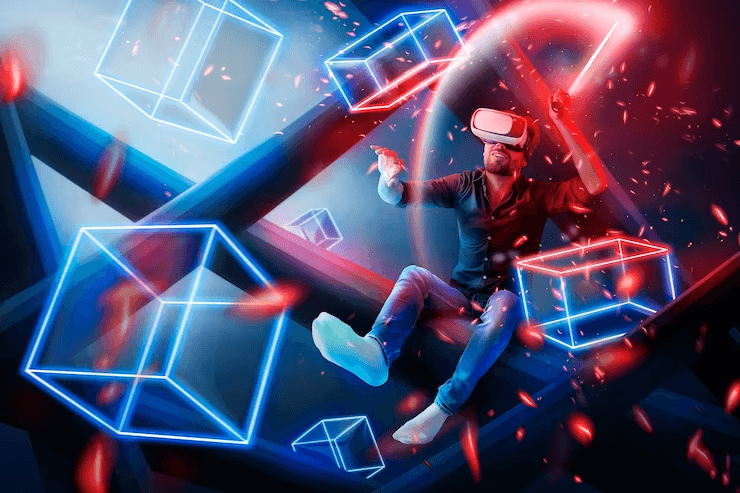
Introduction to Metaverse and its potential in the gaming industry
Metaverse refers to a virtual universe or a collection of interconnected virtual worlds that can be accessed by users through the internet. It offers an immersive and interactive experience where users can interact with each other and the virtual environment. With the increasing popularity of gaming, metaverse development is changing the gaming industry in numerous ways.
One of the main advantages of metaverse in gaming is the potential for creating a truly immersive gaming experience. By using cutting-edge technologies such as virtual and augmented reality, game developers can create highly realistic and interactive game worlds that users can explore and interact with in a more engaging and immersive way.
In addition to immersive gameplay, metaverse development also has the potential to significantly increase user engagement and revenue growth for gaming companies. By creating a more social and interactive experience, users are more likely to spend more time in the game and to invest more money in in-game purchases and virtual items.
Overall, the potential for metaverse development in the gaming industry is vast, and it is likely to continue to transform the way we interact with digital content and each other in the years to come.
Advancements in technology and how it is fueling metaverse development in gaming
Advancements in technology have played a significant role in fueling the development of metaverse in gaming. One of the key technological advancements that has facilitated metaverse development is the development of high-speed internet, which allows for seamless communication between users and the virtual environment.
Another important technology is virtual and augmented reality, which creates a more immersive gaming experience by allowing users to interact with a digital environment in a more realistic and natural way. These technologies have enabled game developers to create more immersive and interactive game worlds that allow for a more engaging gameplay experience.
Furthermore, the development of artificial intelligence and machine learning has allowed for more realistic game characters and environments. With the use of these technologies, game developers can create more lifelike non-playable characters (NPCs) that react to user actions and have a more realistic appearance and behavior.
Blockchain technology is also playing a role in metaverse development by enabling secure transactions of virtual items and currency within the virtual environment. This technology allows for the creation of unique virtual assets that users can buy, sell, and trade with other users.
Overall, the continued advancements in technology are expected to further fuel the development of metaverse in gaming, offering more possibilities for creating immersive and engaging game worlds.
Immersive gameplay experience and how metaverse development is contributing to it
Metaverse development is contributing to immersive gameplay experience in several ways. One of the main ways is by creating a more social and interactive gaming environment. In traditional games, users typically play alone or with a limited number of other players. In metaverse, however, users can interact with a much larger number of other players in a shared virtual space, creating a more dynamic and engaging experience.
Furthermore, metaverse development allows for the creation of highly realistic and detailed game worlds that users can explore and interact with in a more immersive way. By using virtual and augmented reality technologies, game developers can create a more realistic and interactive environment that users can engage with in a natural and intuitive way. This creates a more immersive gaming experience that can feel almost as real as the physical world.
Metaverse development also allows for the creation of more dynamic and emergent gameplay experiences. In traditional games, the gameplay is often static and predetermined. In metaverse, however, the gameplay can be more fluid and dynamic, with emergent gameplay experiences that arise from user interactions and the environment.
Overall, metaverse development is contributing to a more immersive gameplay experience by creating a more social and interactive gaming environment, realistic and detailed game worlds, and dynamic and emergent gameplay experiences. This has the potential to revolutionize the gaming industry and to offer users a more engaging and fulfilling gaming experience.
Increased user engagement and revenue growth for gaming companies through metaverse
Metaverse development has the potential to significantly increase user engagement and revenue growth for gaming companies. One of the key advantages of metaverse is the social and interactive environment that it creates, which can lead to increased user engagement and longer play sessions.
Metaverse also allows for the creation of a more personalized gaming experience. By tracking user behavior and preferences, game developers can create personalized gameplay experiences that are tailored to each user’s interests and preferences. This can create a more engaging experience for users, as they feel more invested in the game and the virtual world.
Metaverse development also has the potential to increase user retention, as users are more likely to continue playing a game that offers a personalized and engaging experience. This can lead to a more stable user base and increased revenue over the long term.
Overall, metaverse development offers significant potential for increased user engagement and revenue growth for gaming companies. By creating a more social and interactive environment, offering personalized gameplay experiences, and creating new revenue streams through virtual items and currency, metaverse has the potential to transform the gaming industry and to offer users a more engaging and fulfilling gaming experience.
The potential for new genres of games in the metaverse
Metaverse development has the potential to create new genres of games that were not possible before. One of the emerging genres is NFT gaming development, which is the creation of games that use non-fungible tokens (NFTs) as a core component.
NFTs are unique digital assets that are stored on a blockchain, which makes them highly secure and tamper-proof. This technology allows for the creation of unique in-game items that can be owned and traded by users. In NFT gaming development, game developers can create games that are specifically designed to use NFTs as a core component.
For example, in an NFT-based trading card game, users can collect and trade unique virtual cards that are represented by NFTs. Each card can have unique properties and abilities, which can make them highly valuable to collectors. NFT gaming development also allows for the creation of unique virtual items, such as weapons, armor, and accessories, that can be bought, sold, and traded by users.
Another potential genre of games in the metaverse is virtual real estate development. In this type of game, users can buy and develop virtual real estate, which can include buildings, houses, and other types of structures. Virtual real estate can be represented by NFTs, which can make them highly valuable and collectible.
Overall, NFT gaming development offers a new frontier for game developers to create innovative and engaging games that leverage blockchain technology and the unique properties of NFTs. As metaverse development continues to grow, we can expect to see more games that leverage NFTs as a core component and offer new and exciting gameplay experiences to users.
The challenges of integrating metaverse technology into the gaming industry
While the integration of metaverse technology into the gaming industry offers numerous advantages, there are also several challenges that need to be overcome. Some of the key challenges include:
1. Technical complexity
Metaverse development involves complex technologies and requires significant expertise in areas such as blockchain, virtual reality, and artificial intelligence. Game developers may not have the necessary skills to develop metaverse-based games, which can be a significant barrier to entry.
2. Interoperability
One of the key features of metaverse is interoperability, which allows users to move freely between different virtual worlds and platforms. However, achieving interoperability can be challenging, as it requires coordination between different platforms and technologies.
3. Scalability
Metaverse platforms need to be able to handle a large number of users and transactions, which can be a significant technical challenge. Ensuring that metaverse platforms are scalable and can handle high volumes of traffic is critical to the success of metaverse-based games.
4. Security
Metaverse platforms are built on blockchain technology, which is known for its security features. However, ensuring the security of metaverse-based games is still a challenge, as hackers may try to exploit vulnerabilities in the platform.
5. User adoption
Finally, the success of metaverse-based games depends on user adoption. Game developers need to convince users that metaverse-based games offer a unique and engaging experience, which can be challenging in a crowded and competitive gaming market.
Overall, while there are significant challenges associated with integrating metaverse technology into the gaming industry, the potential benefits are significant. Overcoming these challenges will require collaboration between game developers, technology experts, and other stakeholders to build robust and scalable metaverse platforms that offer a compelling gaming experience to users.
The future of gaming and the role of metaverse development
The future of gaming is likely to be heavily influenced by metaverse development, which offers a new frontier for game developers to create immersive, engaging, and socially interactive gaming experiences. Metaverse development is expected to have a transformative impact on the gaming industry in several ways, including:
1. Expanded user base
Metaverse-based games offer a new and engaging experience to users, which can help to expand the user base of the gaming industry. Metaverse-based games can attract new users who are interested in social interaction, virtual economies, and unique gaming experiences.
2. New revenue streams
Metaverse-based games can also create new revenue streams for game developers. Virtual goods, services, and experiences can be monetized through microtransactions, subscriptions, and other revenue models.
3. New gameplay experiences
Metaverse-based games offer a new level of immersion and interactivity, which can lead to new and innovative gameplay experiences. Metaverse-based games can incorporate elements of virtual reality, artificial intelligence, and other emerging technologies to create a more engaging and interactive gaming experience.
4. Cross-platform integration
Metaverse platforms can enable cross-platform integration, allowing users to seamlessly move between different gaming platforms and virtual worlds. This can help to create a more interconnected and collaborative gaming experience.
5. Social interaction
Finally, metaverse-based games offer a new level of social interaction, allowing users to connect and interact with other players in a virtual world. This can help to create a more social and engaging gaming experience, which can lead to increased user engagement and loyalty.
Overall, metaverse development is likely to play a significant role in shaping the future of gaming. As metaverse platforms become more advanced and widely adopted, we can expect to see more games that incorporate metaverse technology and offer new and innovative gaming experiences to users.
The impact of metaverse development on the gaming industry and its future prospects
Metaverse development is expected to have a significant impact on the gaming industry, with the potential to transform the way games are developed, played, and monetized. Here are some of the key impacts of metaverse development on the gaming industry:
1. Increased user engagement
Metaverse-based games offer a more immersive and interactive gaming experience, which can help to increase user engagement and retention. This can translate into increased revenue for game developers and publishers.
2. New revenue streams
Metaverse-based games can create new revenue streams for game developers and publishers, such as virtual goods and services, subscriptions, and microtransactions.
3. Cross-platform integration
Metaverse platforms can enable cross-platform integration, allowing users to seamlessly move between different gaming platforms and virtual worlds. This can help to create a more interconnected and collaborative gaming experience.
4. Greater social interaction
Metaverse-based games offer a new level of social interaction, allowing players to connect and interact with other players in a virtual world. This can help to create a more social and engaging gaming experience.
5. New gameplay experiences
Metaverse-based games offer a new level of immersion and interactivity, which can lead to new and innovative gameplay experiences. This can help to attract new users to the gaming industry and expand the user base.
6. Potential for NFT gaming development
Metaverse development also offers the potential for NFT (non-fungible token) gaming development, which can enable players to own and trade in-game assets and items. This can create a new revenue stream for game developers and provide players with a sense of ownership and value in the gaming experience.
Overall, the impact of metaverse development on the gaming industry is expected to be significant, with the potential to transform the way games are developed, played, and monetized. As metaverse technology continues to evolve and become more widely adopted, we can expect to see more games that incorporate metaverse technology and offer new and innovative gaming experiences to players.
Conclusion
The Future of Gaming: How Metaverse Development is Changing the Gaming Industry In conclusion, the future of gaming is being shaped by metaverse development, which offers a new frontier for game developers to create immersive, engaging, and socially interactive gaming experiences. The impact of metaverse development on the gaming industry is expected to be significant, with the potential to transform the way games are developed, played, and monetized.
Metaverse-based games are expected to offer a more immersive and interactive gaming experience, increase user engagement and retention, create new revenue streams, enable cross-platform integration, provide greater social interaction, and offer new and innovative gameplay experiences. Additionally, the potential for NFT gaming development using metaverse technology offers the opportunity for players to own and trade in-game assets and items, creating a new revenue stream for game developers and providing players with a sense of ownership and value in the gaming experience.
As metaverse technology continues to evolve and become more widely adopted, we can expect to see more games that incorporate metaverse technology and offer new and innovative gaming experiences to players. Overall, metaverse development is changing the gaming industry and has the potential to shape its future prospects in exciting and transformative ways.

